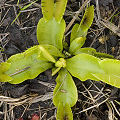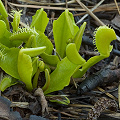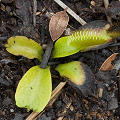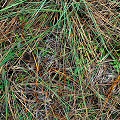Q: Are wildfires good for habitat?
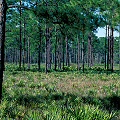
Florida scrub post-fire
A: Because of an overly effective "Smokey the Bear" information campaign in the USA,
people in the states think that all wildfires are bad. This is not the case!
Many environments benefit from periodic wildfires. These wildfires remove accumulated
deadwood. They open areas to plants that require high sunlight. They open habitats to animals that require post-fire
areas to forage or nest. They stimulate some plants to distribute seed, and the seeds of other plants to germinate.
While fires can be damaging immediately after they've swept through an area, viewed on the scales of large landscapes and tens of years,
fires are actually a very natural component of a dynamic ecosystem.
A policy of preventing all fires is unwise because over time forests and other wild lands become
clogged with dense growth. The fuel load on the ground builds and builds.
Eventually the land does catch fire (by lightning or campfire) and the resulting
conflagration, fueled by years of accumulated wood, is disastrously
hot and violent and kills even those plants adapted for normal fires.
Logging industries have argued that because of this, they should be allowed
to log old, overgrown forests. The deceit in this argument is that they are often arguing about
old growth forests that rarely, oh so rarely, burn so hot as to kill the enormous trees that
the damned loggers want for their mills. I have seen forests that have been "thinned
for the benefit of the forests." The amount
soil and habitat damage that results is chilling to behold. I was willing to give the loggers some benefit of doubt
until I saw what they would do when given the opportunity.
While fire is good for many habitats, of course, in no way should you take matters into your own hands and
light wildfires! Specialized burn crews are the only people who are
qualified to carry out burns. If you lit a fire you might damage property
and kill people. Not only that, but you might be lighting the fire at the
wrong time of the year, under bad conditions, etc., and the fire may easily
do more damage to the wildlands than good.
Your role in all this is to understand the proper value of fires in our habitat, and to support its
appropriate use. Responsible conservation organizations
have staff for this kind of work, for example The Nature Conservancy has
an active fire program in most of its state programs.
Incidentally, just as it is inaccurate to say that fire is bad for the environment, it is just as wrong to
say that it is always good for the environment. For example, the
rain forests of the world, and cactus forests of the southwest US and Mexico are not adapted to fire.
Slash and burn policies in
Nepenthes habitat is not a good for anyone or anything.
Page citations: Rice, B.A. 2006a.
